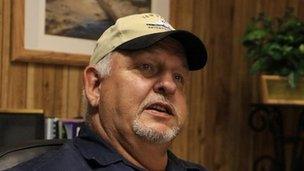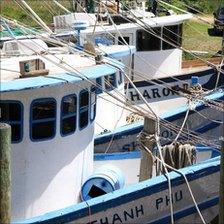BP spill: Life in Gulf of Mexico one year on
- Published
Where has the BP Deepwater Horizon oil gone?
One year ago, the Deepwater Horizon explosion in the Gulf of Mexico killed 11 people and pumped 4.9 million barrels of oil into the ocean in what was one of world's largest oil spills. The BBC's Andy Gallacher went to Alabama find out how residents there were doing.
The mayor of Bayou La Batre in Alabama is spoiling for a fight. Not a raised voices, finger-pointing type of affair but a full-on physical scrap. That is how frustrated Stan Wright, who has been in office for 11 years, has become.
"We was taught down here you have to fight for what you get," says Mr Wright, as he spits chewing tobacco into a brass pot sitting on his cluttered desk.
"I wanna get physical, I wanna beat the hell out of somebody," he continues, slamming his large hand down to make a point.
"You know you done said everything you can say, you done everything you can do, next thing there's the fight. But who you gonna fight when the federal government allows this company [BP] to come in and do this to us?"
Mr Wright's frustrations are echoed across this small fishing village, from the picturesque docks where the fishermen put white shrimp on ice, across to one of several seafood processing plants that are based here.
'Universally despised'
"Nobody would believe that I'm not entitled to what I worked all my life for, generation after generation," says Dominick Ficarino, who owns and operates Dominick's Seafood.
Alabama shrimper's concerns over Deepwater Horizon's effects
Mr Ficarino, like many, is unhappy about a compensation process that is almost universally despised across the Gulf States.
"This boat here received $1,000 (£613)," says Mr Ficarino, pointing to one of his six shrimping vessels.
"A boat tied up next to it received $420,000 as an emergency payment. I asked for an explanation and to this day they can't give me one," he says, complaining that the paperwork pertaining to his business has been lost by those administering the compensation fund several times.
The $20bn restitution fund that BP set aside to compensate people like Mr Ficarino has been run by Kenneth Feinberg since the end of August last year.
He was appointed by the Obama administration and has faced widespread criticism over a process that is viewed as confusing, unfair and too slow by many of the Gulf's residents.
The fund he heads, the Gulf Coast Claims Facility, issued a statement, external on Monday saying it was doing its best to handle claims fairly in what it described as a task of "unprecedented magnitude".
'Down the drain'
So far, $3.8bn has been paid out to those whose livelihoods were affected by the oil spill and Mr Feinberg has indicated that the fund will keep paying out for the next couple of years.

Mayor Stan Wright of Bayou La Batre, Alabama said he was frustrated by his town's situation
That may be too late for a 72-year-old shrimper who would only give his name as Elijah W. He has already spent his life savings just to get through the past year, at a time when he should be retiring.
"A lot of older men are doing the same thing as me, life savings going down the drain," says Elijah, as he stacks heavy boxes full of white shrimp.
"I done got too old to raise hell, wouldn't do me no good anyhow."
Elijah says he is more concerned about his 24-year-old son's future than his own.
There is also now, according to at least one doctor, a worrying trend emerging among the people who were involved in the massive clean up operation.
Dr Mike Robichaux's ear, nose and throat practice in Raceland, Louisiana, has become ground zero for men who claim to have become severely ill.
All of Dr Robichaux's patients say that breathing in the chemical dispersants used to get rid of the crude oil has given them respiratory problems, skin rashes and severe memory loss.
"I'm concerned, I'm concerned for my health," says Andy LaBoeuf, 50, is a tree surgeon by trade who worked out in the Gulf of Mexico for weeks with BP's Vessel of Opportunity programme.
"The worst part about it is I don't have any [health] insurance and if it does do something long term and BP is not responsible then I'm out in the cold, my family is out in the cold," says Mr LaBoeuf.
During our conversation he coughs repeatedly and appears to suffer from memory lapses.
Health hazards
"There's no question in my mind, I'm seeing hundreds of patients all with the same symptoms," says Dr Robichaux.
He says he has no doubt that his patients are suffering because of the chemical dispersants they were exposed to.
"It's such a unique set of circumstances, you can't fake these things," he says.

The Gulf and its fishing communities still face many challenges
Another of Dr Robichaux's patients is former professional wrestler Clayton Matherne.
Mr Matherne was close to the Deepwater Horizon rig when it exploded. The 35-year-old's face is covered in brown rashes caused, says his doctor, by the dispersants.
Mr Matherne and Dr Robichaux describe his symptoms as partial loss of eyesight, severe headaches and coughing, including coughing up blood, spells of weakness and loss of memory. They say tests have shown high levels of toxins in his blood.
When asked how he feels, Mr Matherne, who looks much older than his years, gives a blunt answer. "I pray to God every night that he just let me die," he says.
BP said a thorough medical analysis would be needed before a comment could be made on an individual case.
However, workers involved in the spill response were carefully monitored to make sure they were not over-exposed to chemicals, BP said.
"That exposure monitoring consistently indicated that responders' exposures to chemicals of concern were well below the most conservative occupational exposure limits established by governmental authorities and voluntary professional organisations."
A US government agency, the National Institutes of Health, has launched a long-term study, external that will follow some 55,000 clean-up workers and volunteers for up to 10 years to track possible health effects of the spill.
The research aims to establish whether exposure to crude oil and dispersants impacts physical and mental health - but the results may not be known for some time.
A year after what President Barack Obama called America's environmental 9/11, there are still many challenges to be faced across the Gulf states.
Many people who lost their livelihoods are still waiting for compensation, scientists are still studying the environment to see what long-term damage has been done and there is still a very real perception that the seafood here is tainted.
Additional reporting by Rozalia Hristova.
- Published19 April 2011
- Published19 September 2010
- Published18 April 2011
- Published17 April 2011